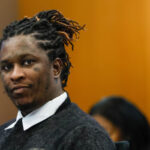Being oppressed in America lends to immediate exposure of America’s harsh realities, which help impregnate the beliefs of the individuals. To believe that the government would infiltrate the Black community and flood it with drugs and guns with the intent of it leading to the community’s could be farfetched until you realize it happened. To believe that local, state and federal authorities would get away with committing subversive acts towards the Black community without being held accountable even after the tactics were supported by fact finding documentation or even recorded through the usage of audio or video is not farfetched at all. Many believe the government helped orchestrate the assassinations of influential Black leaders who fought for both civil and human rights. However, believing that the government had some involvement in the blatant murder of one of Hip-Hop’s most influential musical icons surprisingly is not as believable. Why?
John Potash, a 44-year-old White male, raised in a predominantly Jewish community in Baltimore County penned an interestingly well-written manuscript entitled “The FBI War on Tupac Shakur and Black Leaders.” I had the opportunity to meet John for lunch and converse with him about his book, which I purchased from Everyone’s Place, an independent black owned bookstore located in Baltimore. For obvious reasons, his book is not being carried in any of the major bookstores.
Upon introduction I extended my hand to greet Mr. Potash and immediately our handshake turned to “dap.” We all know that non-verbal communication says just as much as the things we verbalize, sometimes even more. I was anxious to talk because there was so much for us to talk about pertaining to Tupac and the United States Government. The possibilities and theories are truly boundless. Over lunch, a conversation commenced.
AllHipHop:You were quoted in an article in The Baltimore CityPaper written by Bret McCabe that you believed Tupac had become “the most influential Black man in the Black community in the country” which I assume would be the reason, in your opinion, his life would be threatened. Can you expound on that statement?
John Potash: Being that he had the top selling CD’s in the world and was starring in major motion pictures, which made him a rap and film star. He was also engaged to the daughter of Quincy Jones, a well-established and respected person in the entertainment business, which increased his popularity. He had very close relationships with his extended Black Panther Party family, who acted as his mentors. Not to mention that he was trying to do more positive things.
For those who have yet to read your book, could you explain why you believe that Death Row Records were a U.S. Intelligence front against Black activism?
John Potash: A high level police detective named Russell Poole got himself assigned to the murder investigation of Biggie, during his investigation he stumbled across the fact that Death Row Records employed many officers who were considered agents. Poole also found typical intelligence operations such as trafficking drugs, guns and laundering money taking place at Death Row Records.
Do you think Death Row Records was the only label used as a front against Black activism?
John Potash: I’m not certain if there were other labels, just because I didn’t have the time or resources to investigate other labels. However, I will say that Time Warner, the parent company of Death Row at the time, ended up buying the rest of the labels, so I’m sure their operations could have worked towards other labels as well.
Are you scared of any backlash or repercussions with the bold statements and claims that you’re making in your book The FBI War on Tupac and Black Leaders?
John Potash: I’m a little scared, but this is what gives me passion.
In your book, I noticed that you reference being supported by people who were close to Tupac, but you did not mention Tupac’s mother Ms. Afeni Shakur. How does she feel about your book and the research you’ve done in regards to her son?
John Potash: She has not publicly addressed the topic of my book and I can understand why.
What do you intend for your book to accomplish?
John Potash: I hope to get as many people as possible more politically active to save our nations heroes like Mumia Abu Jamal and H Rap Brown; both who are sitting on death row, when they’re much needed back in the community doing great things.
What were the difficulties of publishing this book?
John Potash: Well Kathleen Cleaver, the wife of Eldridge Cleaver, initially took me to her editor. I was told that it was too much to fact check everything. I approached six different publishers with six different proposals and still nothing. So I decided to put it out myself, self-published. I started Progressive Left Press.
Your book suggests and supports the ideas of government agencies use of Cointelpro tactics to control, divide and conquer a community through hip hop. In the hip hop community, there’s speculation that the “Illuminati” is doing the same. In your opinion is there a distinction between the two?
John Potash: I don’t know much about the Illuminati and besides hand signs and other small gestures, I don’t know if it can be proven. So I ask what factors have the best evidence behind them that’s controlling our society? White Anglo Saxon Protestant males are controlling the country and top corporations and that’s a better way to describe it.
Do you find any irony in the fact that you worked as a counselor at a methadone program and you wrote a book about the government conspiring to destroy the Black community through dismantling our leaders with subversive tactics, including infiltrating the community with drugs?
John Potash: I do think that drugs undermine activism in the community. For instance, I feel weed is pushed hard towards the community through the music. Abusing marijuana can cause people to not work towards activism. Towards the end, Tupac himself was getting away from abusing drugs.
In your book “The War on Tupac Shakur and Black Leaders,” you boldly suggest that Toure’ who have appeared on both BET and MTV as a Cultural Critic, as a person who works for US Intelligence. Why?
John Potash: I was just quoting Tupac’s trial lawyer, Michael Tarif Warren, who said he couldn’t believe how Toure’ set in the front row of Tupac’s sexual assault trial and totally misrepresented it, especially when Toure’ covered Tupac’s time in his life closely that whole time. He also insinuated that Tupac may have set up his own shooting at Quad Studios.
Is it true, as implied in your book, that Death Row Records tried to lure Wu Tang Clan from their record label in an attempt to coerce them into helping further their agenda of destroying Black activism?
John Potash: They just tried to lure them to Death Row to disrupt their group. ODB’s brother was a beloved Black activist and he was producing the music. Obviously it didn’t work with Death Row, but US Intelligence inserted an agent in the group as a manager, his name is Michael Caruso, a drug dealing young Mafia kingpin.
You believe that prior to his ultimate demise that there were five government-sponsored attempts on Tupac’s life?
John Potash: Yes.
Because of the manner in which it happened from what’s been reported, you also believe that Jam Master Jay’s unsolved murder was the act of the government?
John Potash: Well because of similar tactics as having a security camera that caught the incident and still no one was apprehended, The New York Times reporting that his death had something to do with the east coast west coast beef and The Baltimore Sun reporting that he was becoming more political and socially conscience. In addition to all of that, he wasn’t robbed.
You also suggest based on your research that verbal clashes between 50 Cent and other rap artists are influenced by the powers to be with sinister intent. Do you not believe that it’s an attempt to sell records by involved parties or in some cases, just the competitive nature of the sport?
John Potash: I think it’s a little of all three, but the unspoken part is that of the US Intelligence. In my book I talk about the incident involving Lil Kim and Foxy Brown’s entourage. Take into consideration, the harsh and disproportionate punishment the artists receive for the incidents they’re involved in.
Based on your findings, do you honestly believe that the government killed Tupac.
John Potash: Of course. They orchestrated his assassination.
Potash could be the supreme conspiracy theorist full of all speculative nonsense, gibberish, just another attempt to confuse and keep us in the dark or one that has unearthed a jagged pill of raw truth. Who knows what to make of the twelve years of research and documentation that John Patosh gathered to support his claims. The evidence in his book is just as hard to dispute as it is to validate. Those who dispute the information have quite a lot of work to counter “The War on Tupac Shakur and Black Leaders.” -AllHipHop

![Da Brat Marries Judy Dupart on 2.22.22 [PHOTOS]](https://hiphopucit.com/wp-content/uploads/2022/02/1645669184565-440x264.jpeg)
![Drake Reveals Photos of His Son Adonis [Photos]](https://hiphopucit.com/wp-content/uploads/2020/03/Drake-and-on-Adonis-HHUCIT.jpg)

![Megan Thee Stallion – “BOA” [NEW VIDEO]](https://hiphopucit.com/wp-content/uploads/2024/05/Megan_Thee_Stallion___BOA__Official_Video__1_12_screenshot-440x264.jpg)
![Doechii Feat. JT – “Alter Ego” [NEW VIDEO]](https://hiphopucit.com/wp-content/uploads/2024/05/Screenshot-of-Doechii-and-JTs-Al-440x264.png)
![Young Thug Feat. Drake Drop – “Oh U Went” [NEW VIDEO]](https://hiphopucit.com/wp-content/uploads/2023/07/Young-Thug-and-Drake-1014x570-1-440x264.png)








